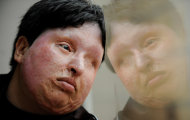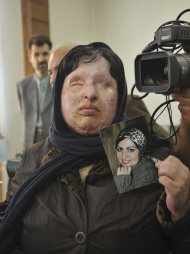This is the story of goodness triumphing over the revengeful attitude. Sharia laws were compiled with the intent of serving justice and not revenge or retaliation.
I am glad Qisas, an eye for an eye is not practiced in 50 of the 56 Muslim majority nations, it is rather a practice of control freaks, rather than Muslims. Forgiveness is the most important aspect of Islamic practice and not retaliation.
God's favorite is one who forgives! Glad the victim chose to forgive. I cannot figure how a doctor was willing to disfigure another human? Something seriously flawed in Iran, Saudi and possibly in Pakistan. Though rare, it is primitive.
Qisas (Arabic/Persian) is an Islamic term meaning "retaliation," and follows the principle of an eye for an eye, or lex talionis, first set forth by Hammurabi, and subsequently included in the Old Testament and later legal codes. In the case of murder, it means the right of the heirs of a murder victim to demand execution of the murderer.
O you who believe, equivalence is the law decreed for you when dealing with murder - the free for the free, the slave for the slave, the female for the female. If one is pardoned by the victim's kin, an appreciative response is in order, and an equitable compensation shall be paid. This is an alleviation from your Lord and mercy. Anyone who transgresses beyond this incurs a painful retribution. The Quran also allows aggrieved parties to forfeit the right of qisas as an act of charity or an act of atonement for sins.
Qisas is enforced today in countries which follow Sharia, including Saudi Arabia, Iran and Pakistan. But rarely any one is revenged.
In Dallas Rais Bhuiyan showed remarkalbe goodness of forgiving the man who made an attempt to shoot him to kill after 9/11. Governor Rick Perry seem like a villian here by not listening to the victim.
Mike Ghouse
# ##
http://news.yahoo.com/iranian-blinded-acid-pardons-her-attacker-153631250.html
TEHRAN, Iran (AP) — An Iranian woman blinded and disfigured by a man who threw acid into her face stood above her attacker Sunday in a hospital operating room as a doctor was about to put several drops of acid in one of his eyes in court-ordered retribution.
The man waited on his knees and wept.
"What do you want to do now?" the doctor asked the 34-year-old woman, whose own face was severely disfigured in the 2004 attack.
"I forgave him, I forgave him," she responded, asking the doctor to spare him at the last minute in a dramatic scene broadcast on Iran's state television.
Ameneh Bahrami lost her sight and suffered horrific burns to her face, scalp and body in the attack, carried out by a man who was angered that she refused his marriage proposal.
Bahrami, whose face remains visibly burned, was a glimpse of her former self, wearing a touch of pink gloss on her lips and a loosely wrapped headscarf to the hospital where the sentence was to be carried out. She was helped into the building by two women who held both her hands.
"It is best to pardon when you are in a position of power," Bahrami said, explaining that she did not want revenge.
The sobbing man, Majid Movahedi, said Bahrami was "very generous."
"I couldn't imagine being blinded by acid," Movahedi said, as he wept against a wall.
It is a legal right for victims in Iran to ask for a strict enforcement of Islamic law, under which an attempt is made to reach a settlement with victims or their families. If no agreement is reached, then "qisas," or eye-for-an-eye retribution, is enforced.
Under the Iranian judiciary's policy of qisas, convicted murderers are sentenced to death. In another example of a case where qisas was carried out, authorities amputated the hand of a convicted thief in front of other prisoners in October 2010.
In the trial of Bahrami's attacker, the court ruling allowed the woman to have a doctor pour a few drops of the corrosive chemical in one of Movahedi's eyes as retribution.
A few months after the November 2008 ruling, Bahrami told a radio station in Spain, where she traveled for treatment of her wounds, that she was happy with the sentence.
"I am not doing this out of revenge, but rather so that the suffering I went through is not repeated," she said in that March 2009 interview.
Though she was blinded in both eyes, she said in the radio interview that the court ruled she was entitled to blind him in only one eye.
After undergoing treatment in Barcelona, Bahrami initially recovered 40 percent of the vision in one eye, but she later lost all her sight.
Tehran prosecutor Abbas Jafari Dowlatabadi said Movahedi would remain in jail until a court decides on an alternative punishment, according to Iran's ISNA news agency.
He said her attacker will have to pay financial compensation as Bahrami has requested. In the past, Bahrami has asked for up to $200,000 in compensation from the assailant.
There have been several other acid attacks on women in Iran. Last week, a young woman died after a man poured acid on her face for rejecting his marriage proposal. Her attacker remains at large.
Amnesty International criticized the Iranian law that allows victims of such attacks to deliberately blind the assailants under medical supervision.
In a statement Sunday, the rights group said the practice was a cruel punishment that amounts to torture.
"The Iranian authorities should review the penal code as a matter of urgency to ensure those who cause intentional serious physical harm, like acid attacks, receive an appropriate punishment — but that must never be a penalty which in itself constitutes torture," said Hassiba Hadj Sahraoui, Amnesty's deputy director for the Middle East and North Africa.



No comments:
Post a Comment